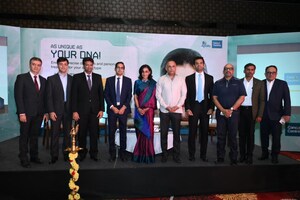Apollo Hospitals' Project Kavach innovations are published in the NEJM Catalyst
- The report delivers insights on how India's largest private health system handled COVID-19
HYDERABAD, India, Feb. 25, 2021 /PRNewswire/ -- Apollo Hospitals, India's largest integrated healthcare chain announced in March 2020, its campaign of Project Kavach, a multi-pronged strategy deployed to curb the COVID-19 pandemic in India. Kavach, which translates to 'shield', encompassed a 360-degree approach.
The innovations pioneered by Project Kavach are highlighted in a February 24, 2021 report in the NEJM Catalyst. NEJM Catalyst is a leading American journal from the prestigious NEJM Group, focusing on the latest innovations, big ideas, and practical solutions for health care delivery transformation.
The Project Kavach commentary sheds light on the unique strategies undertaken by Apollo Hospitals such as the AI-based COVID-19 screener, which saw over 15 million downloads and adaptations in 6 regional languages, 24/7 app-based teleconsultations, doorstep testing, medication delivery across the length and breadth of the country, and remote monitoring services at home.
Authors of the Commentary were Drs. Anupam Sibal, Hariprasad, and Sangita Reddy from Apollo Hospitals, and Professor Murali Doraiswamy from Duke University School of Medicine. Dr. Doraiswamy is also a board member at Apollo.
Dr. Sangita Reddy, Joint Managing Director, Apollo Hospitals, remarked, "To meet the challenges that COVID-19 threw, an integrated approach that deployed the whole Apollo ecosystem was designed. Dissemination of accurate information, early detection and isolation and tech-enabled care in different settings with advanced treatment using the best medical global protocols formed the pillars. With hospitals across 16 states, we provided care to patients in full compliance with advisories issued by different state governments. An innovative approach allowed the launch of ideas like Project Stay-I (Stay Isolated) allowing infected individuals to stay in hotels freeing up beds in hospitals. Care was provided using telemedicine. The initiative served over 80,000 nights and touched over 5 million lives over the period."
Dr Hariprasad President, Apollo Hospitals Group noted that, "Apollo's Project Kavach has delivered exemplary results in terms of combating the COVID-19 pandemic with a phenomenal success rate. Whether it was dedicating the 2,250 beds for exclusive Covid care or setting up over 30 fever clinics, we have always led from the front. Our expertise in handling and managing Covid patients was collated and circulated in a comprehensive SOP driven guidebook called 'The Red Book' in order to help other healthcare institutions to learn from our clinical expertise."
Dr Anupam Sibal, Group Medical Director, Apollo Hospitals, commented, "The multidisciplinary approach of bringing experts from across the Group on a virtual platform provided us with the ability to create clinical guidelines which were modified regularly, as evidence emerged. The guidelines were changed 34 times including twice in a week when data on the benefit of steroids was published. The active participation in multinational clinical trials allowed patients access to novel therapeutic options".
Dr Murali Doraiswamy, Professor of Psychiatry and Medicine, Duke University School of Medicine, USA observed that, "India's handling of COVID-19 has drawn praise globally. India deployed an approach in establishing close collaboration between the public and private sector. Project Kavach showed how the largest Indian private healthcare provider scaled their response and offer many insights and innovative solutions that can be implemented across geographies."
The full report titled, "Apollo Hospitals and Project Kavach: Insights from How India's Largest Private Health System Is Handling Covid-19", can be accessed at the link be accessed on the link below: https://catalyst.nejm.org/doi/full/10.1056/CAT.20.0677
Contacts:
Saurabh Bose,
[email protected]
Logo: https://mma.prnewswire.com/media/1310950/Apollo_Hospitals_Logo.jpg





Share this article